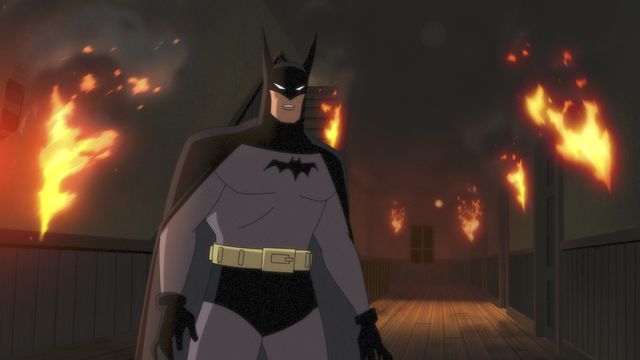The Kitchen will stream on Netflix on a date TBD. This review is based on a screening at the 2023 BFI London Film Festival.
Some dystopias leap into fantastical futures with just a hint of the present societal malaise. The children battling to the death in The Hunger Games, the Kafkaeqsque insanity of Brazil, or the far-reaching stupidity of Idiocracy all poke at contemporary sins through extreme flights of fancy. But for Daniel Kaluuya and Kibwe Taveres’ The Kitchen, the nightmare feels mere moments away.
In this speculative near future, the UK has outlawed all social housing, but a vast London estate called The Kitchen has resisted being decimated. Its residents have formed a community spiritually led by Lord Kitchener (a rare acting turn by charismatic former footballer and broadcast fixture Ian Wright) and come together to feed and protect one another. The communal areas are filled with makeshift shops and restaurants, forming a lively bazaar that is part Blade Runner and Brixton Market. Residents come together for roller disco nights, rap battles, and to show off their bike skills in stark contrast to the rest of the city, which is pristine but desolate. Few people walk its streets and wealth has scrubbed away any personality to create an inhuman cacophony of charmless skyscrapers.
Izi (Kane Robinson) is a resident of The Kitchen who works in a horrifying futuristic funeral home in the city's center that takes those too poor to afford proper burials and turns their remains into soil for plants. He works on commission and sees no problem manipulating potential clients into purchasing additional “fond farewell packages,” guilting them into not being a burden even after they tell their offspring “I don’t want to be a fucking bush!” But the nightmare of being too poor to die is only glanced at; the film’s beating heart is in The Kitchen, laying bare how a community finds the strength to endure occupation and the delegitimization of its existence.
Izi is a compelling antihero, a resident of The Kitchen with one foot perpetually out of the door. He’s internalized some of the rhetoric about the estate, continually referring to it as a “shithole.” Admittedly, the water rarely works, electricity is unreliable, and the residents are subjected to frequent brutality at the hands of the police – but as his colleague Jase reminds him, “That’s them, not us”. At the funeral home, he meets a teenage boy called Benji (Jedaiah Bannerman), the sole attendee at his mother’s funeral who cannot bring himself to form parting words during her service. It transpires Benji’s mother was someone Izi once knew and despite an inauspicious introduction (“It’s your mum’s funeral. I get it. I don’t want to have to tell you to fuck off”), Izi steps in to help Benji out and he too ends up as a resident of The Kitchen. He's also embraced by a local gang of bike-riding activists who will do whatever it takes to protect their home.
While there’s not much reflection on the technological advancements that have taken place in The Kitchen’s vision of tomorrow, it provides a striking portrait of a clear and present danger. The nightmarish raids on the building are forewarned by the community leaning out of their windows and clanging on pots and pans in a dark parallel of the celebrations done for first responders during the COVID-19 pandemic. The residents then have mere moments to barricade themselves in their homes before the police rain terror upon their homes and bodies. But despite this brutal reality, they believe they can exist as long as Lord Kitchener assures them, “We doesn’t become I.”
The political statement of the piece is clear. Still, it doesn’t become overly didactic, with its emotional core of Izi and Benji's evolving relationship punctuated by kinetic action sequences where the residents of The Kitchen strike out against their oppressors. The social constructs that separate crime from law enforcement are flipped, heists becoming acts of heroism and “justice” reframed as the violence perpetrated in service of the privileged few. There are moments that visualize how reductive notions of “Britishness” have cursed this wider landscape: a single Saint George’s flag waving in the breeze from a balcony; drones surveilling citizens with inhuman detachment. These are the artful ways The Kitchen challenges its audience's preconceptions of the charming cinematic London that Richard Curtis, Mary Poppins, and Bridget Jones set in amber.
What makes The Kitchen such a truly impressive feature debut is that it is also such a pleasure to spend time visiting. The dialogue is concise but frequently hilarious. Even with a taciturn lead character, Robinson makes all of his dialogue sing, and moments like Izi and Benji simply discussing the merits of a lamp are utterly enchanting. The aesthetic is just delicious, from the brutalist architecture that frames each flat as a vibrant portrait to the shimmering jewel tones of the parties that light Black skin with a preternatural glow that evokes modern classics Moonlight and City of God.
The dynamics built in the slim 98-minute runtime are as formidable as The Kitchen itself. Izi and Benji’s relationship evolves with all the delicacy of Kramer vs. Kramer and Paper Moon, entering into a tender synchronicity as their story progresses. But their bond and the world of The Kitchen cannot exist in a bubble. And no matter how well-intentioned those at its center are, invading forces must be reckoned with.
Aptly, The Kitchen ends on a challenging note; it may be possible to win a battle, but this is part of a much larger and insurmountable war. As the audience, we are reminded of the very human cost of this dystopia, and how for many across the globe, the speculative horrors of The Kitchen are a cruel reality.







